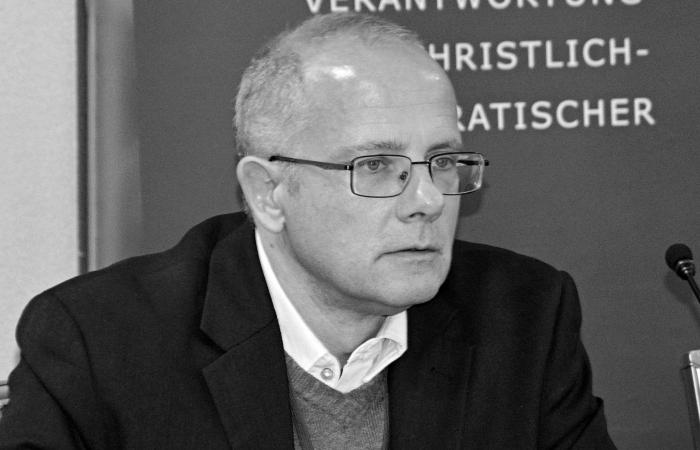Four Eastern European experts launched a call to the German government: “To clarify Germany’s objectives in supporting Ukraine in its defense against Russia’s war of annihilation.” Read the call in full here:
Andreas Umland
Photo: Personal archive
On February 24, 2022, Russia continued its war against Ukraine, which had already been going on for almost eight years, with a major attack aimed at subjugating the neighboring country. Three days later, Chancellor Olaf Scholz described this serious violation of international law in front of the German Bundestag as a “turning point” in Europe and announced a special fund worth billions of euros for the urgent modernization of the Bundeswehr [forțele armate ale Germaniei].
The German government’s decision to now support Ukraine in its defensive struggle by supplying weapons represents a reversal of the cross-party consensus not to supply weapons that could be used in a war against Russia.
Since then, the Federal Republic of Germany has provided Ukraine with considerable assistance: federal, state and local governments, as well as civil society, have contributed politically, economically, financially, technically and practically to mitigating the devastating consequences of the war, not in lastly by receiving and hosting in a non-bureaucratic way an enormous number of war refugees from Ukraine, mostly women, children and elderly people, in a very short time. Germany set an example in this regard, as did Poland, the Republic of Moldova, Slovakia, Romania, the Baltic states and others. In addition, Berlin has made a massive commitment to timely assistance for the rehabilitation of vital Ukrainian infrastructure for energy, drinking water, district heating and railways destroyed by Russian missiles, drones, artillery and others.
Aid to repair civilian facilities destroyed by Russian forces, namely hospitals, schools, kindergartens and apartment blocks, contrasts with Germany’s military support for Ukraine, which has only been provided in incremental steps over months. Starting with the promise of a reasonable number of combat helmets, followed by the hesitant delivery of armored recovery vehicles or bridge launchers, then howitzers and anti-aircraft guns, and ending with the recent announcement of the delivery of infantry fighting vehicles and battle tanks – still in preparation -, almost a full year has passed, a year of intense fighting in the north, east and south of Ukraine, with high death rates among the military on both sides. In addition, there were numerous civilian casualties of all ages in all regions of Ukraine, as well as devastating destruction of vital civilian facilities.
As opportune as the non-military and military support of Ukraine in its defensive struggle against the aggression of the Russian Federation may be, it is not clear what strategic objective the ruling coalition in Berlin ultimately pursues through this. In this sense, the communication of the German government causes irritation not only within Germany. Phrases like “Ukraine must not lose” or “the Russian Federation must not win” do not create clarity, but rather cause political uncertainty and harm our country.
This “blind spot” of German policy regarding Ukraine must urgently give way to political clarity! This means: the German government must – finally – make a clear statement about the objective it ultimately pursues by delivering military equipment, humanitarian aid, as well as providing technical support, intelligence and anti- – cyber for Ukraine. The preservation of the sovereignty of the Ukrainian state, the integrity of its territory and the reconstruction of the country after the war must be the essential cornerstones. This includes the fact that the liberation of the territories of Ukraine already occupied and annexed by Russia in 2014 and also in 2022, in violation of international law, must play a central role. The formulation of such a strategic objective should be coordinated with NATO and EU partners.
In addition, it is necessary to demand that the leaders of Russia responsible for launching the war of aggression against Ukraine be prosecuted and convicted for “crime of aggression” within the meaning of art. 8 bis of the Rome Statute of the International Criminal Court. It is not without irony that it was the Soviet international law expert Aron Naumovich Trainin who, as legal advisor to the Soviet prosecution at the Nuremberg trials against the “Third Reich” elite in 1945/46, had a significant contribution to the worldwide recognition of this crime as the most serious crime in international criminal law today.
Regardless of possible interim measures, such as a temporary ceasefire on certain portions of the current front line, a general ceasefire and negotiations on a future peace agreement, the objective must be to restore Ukraine’s sovereignty over its entire national territory in border framework of 1991. Its territorial integrity must be protected through international guarantees backed by military sanctions — unlike the 1994 Budapest “Memorandum”, which was violated by the Russian Federation.
The Federal Republic of Germany has a very special political and moral responsibility towards Ukraine for several reasons: on the one hand, it is in continuity with the German Reich, which occupied the whole of Ukraine in the First World War – not least in order to was economically exploiting the coal and iron ore region of eastern Ukraine, the Donbass, around the cities of Donetsk and Luhansk, a region that was still important because of the war. This plan was then continued by National Socialist Germany in its war of aggression and extermination against the Soviet Union during World War II. The main theaters of German aggression, including the brutal occupation regime and the Holocaust, were the Soviet republics of Ukraine and Belarus, and the western part of the then Russian Soviet Federative Socialist Republic (RSFSR). In reunified Germany’s view of history there is an enormous gap with regard to Ukraine that needs to be filled urgently.
From this it follows that: Germany has a historically conditioned debt to Ukraine, whose existence is acutely threatened: Wehrmacht, Einsatzgruppen and SS devastated Soviet Ukraine for years, starting on June 22, 1941, they killed almost all the Jews and ” Ukrainian “gypsies” and shot thousands of resistance fighters designated as “bandits”. Over six hundred of the so-called “fire villages”, which were razed to the ground by the SS, Wehrmacht and their auxiliaries after completely killing the village population, were in Ukraine. At the same time, millions of Ukrainians were deported to forced labor “in the Reich”, and the same number of prisoners of war from the Soviet Ukrainian Red Army were left to starve in prisoner-of-war camps – here, with us, at Stukenbrock, Sachsenhausen and Bergen-Belsen, not in the distant “Reich Commissariat Ukraine”. How many Ukrainians fought on the Soviet side in the battle for Berlin in the spring of 1945 and how many met their death on the heights of Seelow and in the forests of Brandenburg is not known even today – in any case, there were tens of thousands.
“8 May [1945] it was a day of liberation. It freed us all from the inhuman system of National Socialist tyranny,” said then-Federal President Richard von Weizsäcker in 1985. Today, it is about freeing parts of Ukraine from a brutal occupation by another system of tyranny, but just as inhuman.
There are many indications that Russia’s leaders are playing a timing game – in the hope that German support for Ukraine will soon wane. It is the responsibility of the German government to undertake to remind the public again and again of the significance of military support in particular. In the face of the German debate, which from the beginning has been characterized by calls for the Russian-attacked Ukraine to “negotiate” rather than resist, the German government should make clear that arms deliveries and negotiations are by no means mutually exclusive. Read the entire article and comment on contributors.ro






